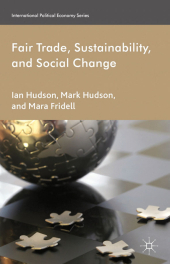 Neuerscheinungen 2013Stand: 2020-01-07 |
Schnellsuche
ISBN/Stichwort/Autor
|
Herderstraße 10
10625 Berlin
Tel.: 030 315 714 16
Fax 030 315 714 14
info@buchspektrum.de |

M. Fridell, I. Hudson
(Beteiligte)
Fair Trade, Sustainability and Social Change
1st ed. 2013. 2013. xii, 225 S. 216 mm
Verlag/Jahr: SPRINGER PALGRAVE MACMILLAN; PALGRAVE MACMILLAN UK 2013
ISBN: 1-349-44413-8 (1349444138)
Neue ISBN: 978-1-349-44413-7 (9781349444137)
Preis und Lieferzeit: Bitte klicken
The authors critically evaluate the fair trade movement´s role in pursuing a more just and environmentally sustainable society. Using fair trade as a case study of the shift toward non-state forms of governance, they focus on its role not only as a regulatory tool, but as a catalyst for broader social and political transformation.
1. Things and What They Hide 2. Car Trunks to Shipping Containers 3. The Persistence of Poverty 4. Free Riding and the Fairness Frame 5. Power and Consumption: Corporate Countermovement and the Threat of Asymmetry 6. W(h)ither, Fair Trade? Afterword: Fair Trade in A Boom Market
´This is an excellent new work and a must read for anyone interested in trade justice and, its antithesis, corporate dominance of the world trading system. The book is broad in its depth, intellectually scrupulous, and a pleasure to read. The authors offer thought-provoking new insights and the challenging conclusion that, despite many bumps on the road, fair trade (at its best) represents an alternative to large scale, capitalist agriculture by altering the relations of production, exchange and consumption.´ Gavin Fridell, Saint Mary´s University, Canada
´This book blows the lid off populist ideas that fair trade is necessarily a poverty busting strategy for coffee producers in the Global South. Theoretically rigorous and empirically rich the book explores how fair trade does have within it a deeply transformative potential. Yet for this to be realised it needs to go well beyond the rhetoric of the need for social and economic justice. The authors show that for fair trade to deliver on its slogans of justice and a fairer trade regimes it needs to ´dissolve the cornerstone of capitalist society: the fetishism of commodities´. Capitalism itself needs to be transformed. This is an essential text for students and activists who want to know what the strengths and limitations are of fair trade.´ - Ray Bush, University of Leeds, UK


